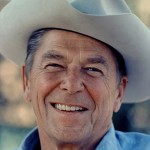Reagan's Forgotten Environmental Legacy
 During his presidency, Reagan faced an atmospheric pollution problem which, like climate change today, divided the political class.
During his presidency, Reagan faced an atmospheric pollution problem which, like climate change today, divided the political class.
Republicans are celebrating the 100th anniversary of Ronald Reagan’s birth this February 6 with great enthusiasm.
They should. For the GOP, Reagan is a unifying figure who showed Americans what was possible under Republican leadership that skillfully blended principle, pragmatism, and verve to serve the nation.
They should do more than celebrate, however. They should reflect.
Reagan’s greatest leadership gift was his magnetic optimism. He earned the respect of Americans, whatever their political leanings, with his unalterable belief that America was on top of its game and getting better all the time.
Many of today’s GOP leaders, to a large extent, lack that gift. Where Reagan brought us cheer and the uplifting politics of inspiration, too many of his political successors exude gloom and the burdensome politics of blame and resentment.
President Reagan also was a thoughtful, traditionalist conservative who was always mindful of our stewardship obligation to future generations. Where Reagan sought to prudently solve problems through lean and efficient governance, many of today’s GOP leaders are content to dismiss problems in pursuit of political expedience.
There’s no better example than to compare Reagan’s confident, prudent handling of a big atmospheric pollution problem during his time with the fearmongering obtuseness about a big atmospheric pollution problem of today that has been exhibited by those who would claim his mantle.
The parallels between then and now bear examination.
Then and now, climate scientists’ conclusions that human-caused emissions were tampering with the workings of the atmosphere were the stuff of political disputes and ideological posturing.
Then and now, talk of phasing out the troublesome emissions prompted turgid predictions, many from Reagan’s fellow Republicans, that the result would be economic catastrophe.
Then and now, the political class was divided and the matter was in the president’s hands.
Then, however, the president acted with dispatch. President Reagan took the scientists seriously and ordered his diplomats to negotiate a treaty to begin phasing out refrigeration chemicals that were depleting the upper atmosphere’s protective ozone layer, the thin layer of oxygen molecules that dampen the incoming flow of dangerous ultraviolet radiation from the sun.
That treaty was the Montreal Protocol, which Reagan called a “monumental achievement.” It was the basis for subsequent strengthening agreements and a Clean Air Act amendment that headed off a disaster and protected billions of people.
In a what-if study published in 2009, NASA scientists concluded that without the Montreal Protocol, we’d be headed for a world of soaring skin cancer rates and grievous environmental damage. “We simulated a world avoided and it’s a world we should be glad we avoided,” one of the scientists commented.
Meanwhile, here in the real world as modified by the Montreal Protocol, U.S. manufacturers developed safer substitutes for the offending chemicals, marketed them successfully, and continued to operate profitably.
It’s a safe bet that Reagan had no doubt that they would succeed. He believed in America’s power to innovate and thrive, not because it made for snappy speeches, or because it tested well in focus groups, or because Beltway consultants advised him to, but because he simply believed and said so with a narrative power and with a sunny disposition that inspired his fellow Americans to share his belief.
We can’t know with certainty what Reagan would do if he were president today and faced with climate change. All we can do is look at his record and ask today’s Republican leaders to demonstrate their admiration for our 40th president by following his good example.
Happy 100th Birthday, Ronald Wilson Reagan.
Tweet